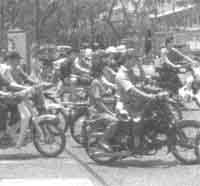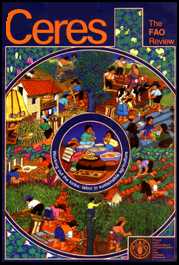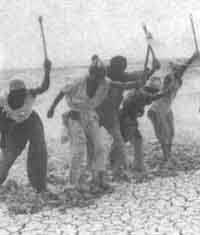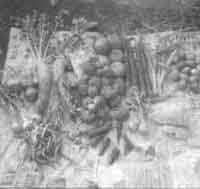

July-August 1994
The FAO Review
Food and Agriculture Organization of the United Nations
"Man may work from sun to sun,
but woman's work is never done"
- Anonymous folk saying

Moped to Mercedes: Vietnam is changing from a poor, overlooked pariah nation to the darling of lenders and aid agencies. But does it now risk drowning in its new-found dollars?

Looking at labor: Low-input, sustainable farming systems seem to imply a lot more work to replace expensive machinery and inputs. How much is too much, and how should the labor be apportioned?

Together with Tekei: Japan's consumers are willing to pay more for less-than-perfect produce, whose insect holes prove vegetables have been grown organically. Home-makers are partners with farmers.

Against the GATT: Hyped as a needed stimulus to expanded world trade, the GATT has also sowed seeds of discord, prompting economist/critics to propose an alternative: The new protectionism.
Chief Editor: Thomas Pawlick
Associate Editor: Kate Dunn
Art Editor: Christian Besemer
Copy Editors: Dominique Hoeltgen, Medhat Makar, Enrique Yeves
Editorial Assistant: Laure Calderan
DTP Assistant: Emelyn Alazard
Managerial Assistant: Isabella Moretti
Editorial Policy Board: P.J. Mahler (Chairman), M. de Francisco, B. Huddleston, K. Killingsworth, J.P. Lanly, R. Lydiker, T. Pawlick (ex officio), M. Randriamamonjy, R.L, Welcomme, M.S. Zehni, M. Zjalic
Collaborating on this issue: Della Kennedy, Lorenza Manzi and Michelle Snow
Published bi-monthly by the Food and Agriculture Organization of the United Nations. ISSN 0009-0379. The opinions expressed by the contributing authors are not necessary those of FAO or Ceres. The designations employed and the presentation do not imply the expression of any opinion whatsoever on the part of the Food and Agriculture Organization of the United Nations concerning the legal status of any country, territory, city or area or of its authorities, or concerning the delimitation of its frontiers or boundaries. Individual articles and photographs not copyrighted may be reprinted provided the credit line reads: "Reprinted from Ceres, the FAO Review", and two voucher copies are sent to the Editor. Unsolicited manuscripts and art work not accompanied by return postage will not be returned.
Editorial Offices: FAO, Viale delle Terme di Caracalla, 00100 Rome, Italy.
Tel.: (6) 52254094
Fax: (6) 52256167
Cover design by Arte Minka - A. Poma, J. Lindo, E. Mantari
This electronic document has been scanned using optical character recognition (OCR) software and careful manual recorrection. Even if the quality of digitalisation is high, the FAO declines all responsibility for any discrepancies that may exist between the present document and its original printed version.
Vietnam fights to stay afloat in sudden deluge of aid dollars
NGOs encourage Vietnamese counterparts
Formula versus mother's milk: the boycott battle continues
The forest sinister: researchers sound an alarm at Chernobyl
Taiwan farmers find a little goes a long way
The enemy of my enemy is my friend: OAU pits wasps against stem borers
Climbing for the top in Rwanda
Devaluation of the CFA franc: a shudder of upheaval in west Africa
Raining stones: Chiapas rebels fight for agrarian reform
FAO in action
Low-input farming: Is it worth the work?
The Kofyar variations
Where inventions were the mother of necessity
Gender analysis has a crucial role in planning workable farming systems
Labor in low-input systems: A bibliography
The toilers of the field
Tekei: A farmer/consumer alliance succeeds in Japan
Transplanted: the odyssey of "the Outsiders"
The year of the hype: Did pushing GATT through only profit the few?
Noted & noteworthy
Letters to the Editor